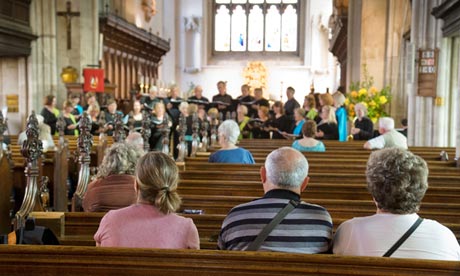Christians could be in a minority in England and Wales by 2018, according to analysis of the latest census results which have revealed a fall of more than 4 million in the number of people who describe themselves as adhering to the faith.
The decline in Christianity came amid a wider fall in the number of people professing belief in any religion, although that trend was partially offset by an increase of 1.6m in the number of Muslims.
Secularists said the trend away from Christianity was a warning to church authorities that their conservative attitudes were not playing well with the public.
The Office of National Statistics revealed the decline at the same time as the Church of England's house of bishops met to discuss the crisis over the synod's decision last month to reject the ordination of female bishops. It also came as the government responded to religious opposition to same-sex marriage by announcing proposed legislation explicitly stating that it will be illegal for the Church of England and the Church in Wales to marry same-sex couples, and that canon law, which bans same-sex weddings, will continue to apply.
Christianity remains the largest religion in England and Wales, with 33.2m people, or 59% of the population, saying they follow the faith. But 14.1m people, around a quarter of the population and an increase of 6.4 million over the decade, said they had no faith at all. The highest proportion of non-believers were in the student enclaves of Brighton and Norwich, where more than 42% said they had no religious affiliation, followed by the south Wales areas of Bleanau Gwent, Caerphilly and Rhondda (all around 41%).
Hull was identified as the place with the sharpest decline, 17%, in its Christian population.
A spokeswoman for the Church of England said the figures "confirm we remain a faithful nation" but admitted "the fall in those choosing to identify themselves as Christians is a challenge".
"One of the reasons may well be fewer people identifying as 'cultural Christians', ie, those who have no active involvement with churches and who may previously have identified as Christian for cultural or historical reasons," said Rev Arun Arora, director of communications for the Archbishop's Council. "They indicate a changing pattern of religious life in which traditional or inherited identities are less taken for granted than they used to be."
A spokesman for the Catholic Bishops' Conference of England and Wales said the decrease was consistent with recent social attitude and social value surveys.
"While this is a challenge, the fact that six out of 10 people in England and Wales self-identify as Christians is not discouraging," he said. "Christianity is no longer a religion of culture, but a religion of decision and commitment. People are making a positive choice in self-identifying as Christians."
Ahead of the 2011 census the British Humanist Association used the slogan: "If you're not religious, for God's sake say so!", to encourage the non-religious to tick the 'No religion' box. The BHA has now calculated that if the change in Christian belief over the decade to 2011 continues at a linear rate, Christians would be in the minority by the census question from September 2018.
"This is a really significant cultural shift," said the BHA chief executive, Andrew Copson. "In spite of a biased question that positively encourages religious responses, to see such an increase in the non-religious and such a decrease in those reporting themselves as Christian is astounding.
"Of course these figures still exaggerate the number of Christians overall – the number of believing, practising Christians is much lower than this and the number of those leading their lives with no reference to religion much higher."
The BHA said the census figures were used in parliament to justify the extension of faith schools, bishops in the House of Lords and spending on other religious organisations.
"It is time that public policy caught up with this mass turning away from religious identities and stopped privileging religious bodies with ever increasing numbers of state-funded religious schools and other faith-based initiatives," said Copson. "They are decreasingly relevant to British life and identity and governments should catch up and accept that fact."
Only 13,832 people explicitly identified themselves as humanists, far fewer than the 176,632 who said they considered themselves Jedi Knights, but more than the 6,242 who said they had No religion: Heavy Metal.
"Such an enormous reversal in the space of 10 years is an indication of the huge upheaval there has been in religious attitudes in Britain," said Terry Sanderson, president of the National Secular Society. "It should serve as a warning to the churches that their increasingly conservative attitudes are not playing well with the public at large. It also calls into question the continued establishment of the Church of England, whose claims to speak for the whole nation are now very hard to take seriously."
People who identified themselves as Muslims in 2011 numbered 2.7 million, up from 1.55 million in 2001. Muslims now make up 4.8% of the population, compared with 3% in 2001. The Muslim population is highly concentrated, with 12.4% of the population of London now Islamic, followed by the West Midlands, and Yorkshire and the Humber (both under 7%). The boroughs with the fastest growing Islamic populations were Redbridge in London, which grew by 11.4% over the decade, and Luton and Slough, both up 10%.
"It is a growing percentage and we need to think about the best possible way to engage with Islam and Muslims and think about whether people should be having days off for Eid, how Ramadam is accomodated and its value recognised, and how religion is taught in schools," said Julian Bond, director of the Christian Muslim Forum. Guardian

